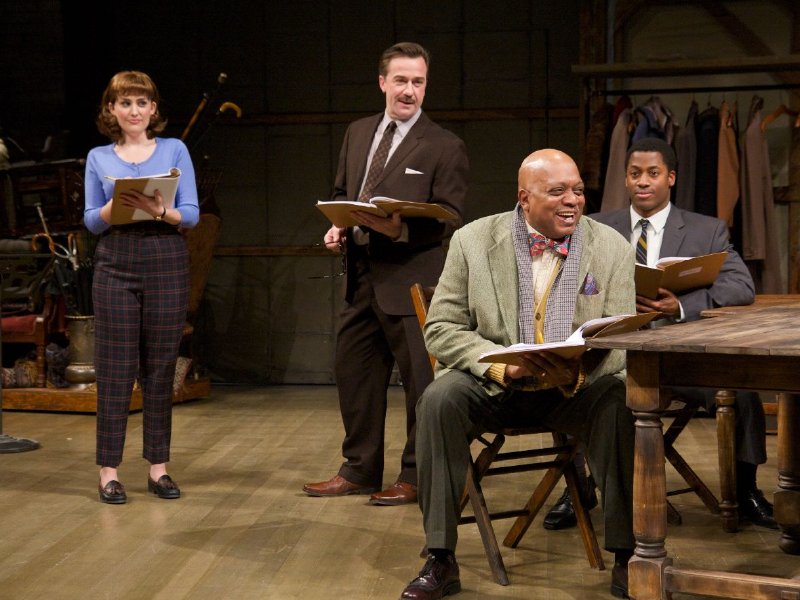It's been nearly a year and a half since Mark Clements assumed the artistic directorship of the Milwaukee Rep with the full expectation that he was bringing change. He has accomplished that.
Clements is a Brit who has spent most of his career in England. He is as comfortable directing musicals as he is staging straight plays. His theatrical esthetic and personal style are unlike those who preceded him in the Rep's top artistic job.
Certainly beginning his tenure last season with a visceral production of "Cabaret" put us on notice that Clements was willing to be bold and different. But seminal change did not occur until last Friday night, when the Rep opened a brilliant production of the Pulitzer Prize-winning musical "Next to Normal."
It was among the most stunning evenings in the company's 57-year history and dramatically signaled the arrival of an exciting new era for one of Milwaukee's core arts groups.
The show demonstrates the Rep is completely capable of telling a touching and achingly human story in a way we have never before seen on its stages.
"Next to Normal" arrived on Broadway in the spring of 2009 without the pedigree of famous creators. Brian Yorkey, who wrote the book and lyrics, was a Broadway rookie, and composer Tom Kitt's experience was mostly as a conductor, orchestrator and musical director. Their show was the antithesis of the frothy or overdone musicals that dominate in New York.
The topic was tragic loss and bipolar disorder within the context of an average suburban family. The style was lean and muscular. The result was an emotionally draining but profoundly poignant experience for the audience.
This was accomplished by using a driving pop-rock score, rather than dialog, to establish a brisk pace and tell a difficult story. "Next to Normal" is more 21st century operetta than traditional musical. It contains spoken lines, but they set up the revelations found in the music, the reverse of the norm.
Relentless honesty and authenticity trump show bizzy pretension, and that is "Next to Normal's" greatest strength. We watch a middle-aged wife and mother grasping for hope as she rotates through a repeated cycle of psychotherapy, prescription meds and rejecting the medications because of their effect on her. We also watch the exhausting toll this takes on her husband and teenage daughter.
Staged in a large Broadway theater with its original cast, "Next to Normal" was such an engaging and surging roller coaster ride, the audience had reason to question its own sanity after the curtain call. The show threw a heavyweight punch.
Nuance has been heightened, irony has been sharpened, and the show's emotions have become more tightly focused. The sledgehammer has been replaced by a scalpel.
The line between musical and play is completely blurred here, as director Clements demonstrates how a deeply delicate story can be told with contemporary music in a style that can legitimately be called literary. It may be game changing in its approach, but "Next to Normal" fits into the Rep's half-century long tradition of producing serious, substantive theater.
This thrilling triumph is attributable to many who collaborated on the Rep production, starting with Clements and including musical director Dan Kazemi and designers Todd Edward Ivins (set), Alex Tecoma (costumes), Jeff Nellis (lighting) and Nick Kourtides (sound).
Four of the six actors in the cast have Broadway credits, and that is reflected by the group's exceptional singing voices and the smooth fluidity of the performances. Jarrod Emick, who was awarded a Tony for his work in a revival of "Damn Yankees," portrays two different doctors here. Tim Young was the original Broadway understudy for the role of the family son, the character he sensitively plays here.
Kevin Vortmann's gorgeous tenor has been heard in the Broadway revival of "A Little Night Music." He is cast as the husband/father in "Next to Normal."
Sarah Litzsinger has the distinction of being Broadway's longest-running Belle in "Beauty and the Beast." All of the performances in this Rep production revolve around her unsettling portrayal of the bipolar mom and wife.
Wiry and petite, she layers a persuasively edgy energy over an all-American soccer mom look. She and Vortmann make a heartbreaking married couple, drawn together and blown apart by the events and circumstances of their shared life.
Although Broadway is not on their resumes yet, Laurie Veldheer and Danny Henning more than hold their own in this cast. Veldheer's portrait of the family's teenage daughter exudes genuine pain, confusion and anger. Henning is sweet and real as her concerned stoner boyfriend.
"Next to Normal" is not depressing. As all good theater does, it holds up a mirror to life and convinces us that whatever our problems, we are not alone.
Damien has been around so long, he was at Summerfest the night George Carlin was arrested for speaking the seven dirty words you can't say on TV. He was also at the Uptown Theatre the night Bruce Springsteen's first Milwaukee concert was interrupted for three hours by a bomb scare. Damien was reviewing the concert for the Milwaukee Journal. He wrote for the Journal and Journal Sentinel for 37 years, the last 29 as theater critic.
During those years, Damien served two terms on the board of the American Theatre Critics Association, a term on the board of the association's foundation, and he studied the Latinization of American culture in a University of Southern California fellowship program. Damien also hosted his own arts radio program, "Milwaukee Presents with Damien Jaques," on WHAD for eight years.
Travel, books and, not surprisingly, theater top the list of Damien's interests. A news junkie, he is particularly plugged into politics and international affairs, but he also closely follows the Brewers, Packers and Marquette baskeball. Damien lives downtown, within easy walking distance of most of the theaters he attends.







